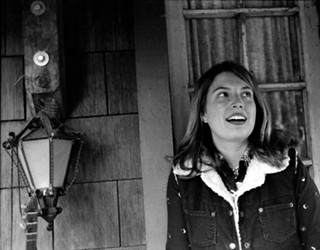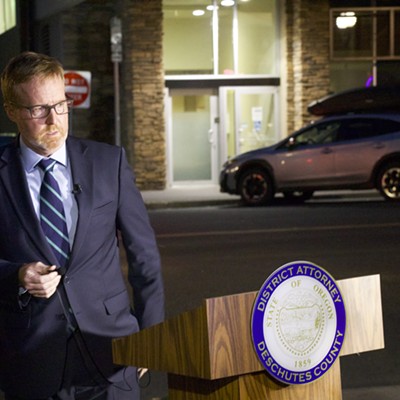Some may wish they never had to be in the same room with her. For others, her decisions may set their lives on a better course.
Alycia Sykora—a civil lawyer in Bend since 2002—was sworn in as Deschutes County's newest circuit court judge in November, replacing Judge A. Michael Adler, who had served since 1997.

"I have respect and appreciation for all the judges in our community, and all of my colleagues at the court, including non-lawyers," Sykora said. "It is a profoundly busy court with many types of cases coming at a very fast pace."
Sykora explained that despite rapid population growth in this area, the number of judges in Deschutes County has stayed at seven since 1997. State legislators may decide to add an eighth seat next year.
Sykora was born in Detroit, Michigan, and graduated from the University of Michigan and later, the University of Oregon School of Law. After graduation, she clerked for the Oregon Supreme Court and severed as an Honors Attorney for the Oregon Department of Justice. She wrote the book "The Oregon Constitution and Cases," along with several chapters on civil procedure for Oregon State Bar Books.
Before she was interviewed and appointed by Gov. Kate Brown, several committees and the Oregon State Police did screenings. Sykora's appointment comes in the middle of Adler's six-year term, so to keep her judicial seat, she'll run in the 2020 election.
While TV shows normally depict judges presiding over life-and-death cases with dramatic lawyers and divided juries, much of Sykora's job as a trial judge is making decisions either before, after or instead of a trial. This could include decisions about restraining orders, child custody or sentencing orders for convicted criminals, for example.
"Part of the job involves making decisions that will make one or all the people unhappy," Sykora said, noting that this sometimes happens in family cases involving children and divorce. "Those are some of the more emotionally challenging situations for people, because they involve intimate relationships and children."
“[The Fourth Amendment] is one of the most litigated areas of criminal law and it involves a person’s privacy rights. For example, you have a privacy right in this phone sitting right here, in your laptop, in your clothing, in your physical person.”— Judge Alycia Sykora
tweet this
Constitution in the Classroom
When she's not on the bench, Sykora enjoys mountain biking, skiing and running, and she's on a local indoor soccer team. She also volunteers for the American Constitution Society, coordinating presentations by local lawyers and judges at schools in Bend, Redmond, Prineville and Culver and "anywhere that a teacher requests a visit." These "Constitution in the Classroom" events usually fall close to Constitution Day—September 17—the day in 1787 that the delegates to the Constitutional Convention signed the document in Philadelphia.
Sykora said that students particularly love to learn about the Fourth Amendment—the part of the Bill of Rights that prohibits unreasonable search and seizures.
"It is one of the most litigated areas of criminal law and it involves a person's privacy rights," she said. "For example, you have a privacy right in this phone sitting right here, in your laptop, in your clothing, in your physical person."
"Kids in school can identify with their privacy rights in their devices," Sykora said. "However, the standard to allow school officials to search or seize is easier in a public school. This is not because people don't care about kids' rights; it's because children have a state-mandated constitutional right to an education, and school districts have a duty to allow kids the opportunity to learn without substantial disruption by other students."
Justice in Oregon
One of the things that makes Oregon law unique is its leadership and independence in state constitutionalism, Sykora said. While many states just follow the federal constitution, Oregon judges have a saying, "first things first," meaning they consider the state constitution before consulting the federal document, if possible. Due to the Supremacy Clause, if there is a conflict in laws, the U.S. Constitution prevails.
Sykora recognizes the leaders in the movement that continue to guide Oregon today, including retired Oregon Supreme Court Justices Hans Linde and Jack Landau, as well as Oregon Court of Appeals Judge David Schuman.
"I have a deep respect for the independence and integrity of their leadership," she said. "I would hope to continue the tradition that was set by judges who came before me."
When asked if there were challenges to being a woman judge, Sykora concluded:
"There are very fine women judges in Deschutes County, in the State of Oregon and certainly on the U.S. Supreme Court... I appreciate this opportunity."


























